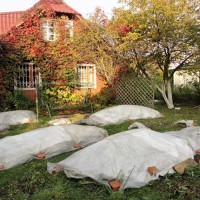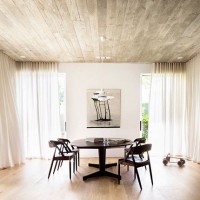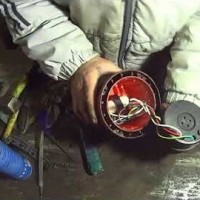Requirements for a room for installing a gas boiler: norms and rules for arrangement
In the vast majority of situations, natural gas is the cheapest type of fuel for organizing autonomous heating and hot water supply. However, you must agree that this energy carrier is very explosive. If the boiler operating on it is installed and connected incorrectly, then disaster is not far away. Therefore, it is worth studying in advance the requirements for the room for installing a gas boiler, familiarizing yourself with the regulations and rules for installing this equipment.
Before you start installing a heating boiler, you should carefully study the requirements for the room for its installation. Only if these standards are observed will it be possible to talk about the safety of using gas appliances. Moreover, gas workers will not even connect you to the pipe if the gas equipment is not installed in proper conditions.
The content of the article:
Requirements for rooms with gas boilers
The rules regulating building standards for the installation of kitchens and boiler rooms for gas-fired equipment are aimed at increasing safe operation of devices. You should not neglect them, otherwise serious problems are not far away.
Methane and propane-butane burned in domestic boilers are explosive. If, due to a leak from a pipe or cylinder, this gas fuel begins to accumulate in the room, then cotton with some kind of destruction is inevitable.
Subject to certain rules, gas boilers can be installed:
- in kitchens in apartments and private houses;
- in the basement and attic of the cottage;
- in the garage and small workshop;
- in a separate or located directly in a residential building boiler room.
If the installation of equipment is carried out by a private individual in order to create an autonomous heating and/or hot water supply system, then everything is quite simple with the supervisory authorities.
The gas supply organization will check the premises for compliance with standards and the boiler itself for correct connection. She is the one responsible for control in this matter. If the gas workers don’t like something, they simply won’t let you connect to the pipe.
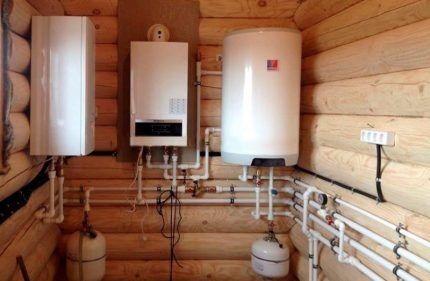
If the gas boiler is powerful and is installed by an individual entrepreneur or a legal entity, then it will additionally have to be registered with Rostechnadzor. Specialists from this organization will also come to inspect the premises.
Also compliance with the rules gas boiler room devices will be controlled by firefighters from the Ministry of Emergency Situations. They regularly go from house to house, checking the serviceability of ventilation and smoke removal systems.
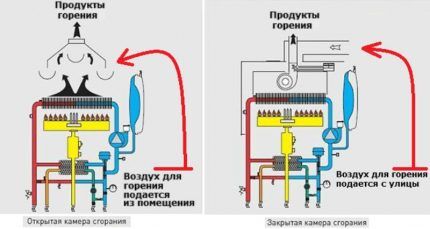
There are plenty of inspectors. If any of them in the room where the gas boiler is installed sees even the slightest deviation from the norms, then the equipment will have to be turned off until the defects are eliminated. It is better to initially make an effort to ensure that everything complies with the rules, rather than later being left without heat and hot water.
Boiler room in a private house
A boiler room attached or installed inside a cottage must be made of non-combustible materials (brick, concrete).The interior finishing is also made non-flammable, preventing the spread of fire.
An extension for a gas boiler must:
- have a separate foundation and floor made of concrete or ceramic tiles;
- attach to a blank solid wall of the house;
- stand at least 1 meter from any window or door of the cottage;
- equip natural ventilation based on a minimum of three air changes per hour;
- have a natural lighting with opening window with an area of at least 0.03 m2 at 1 m3 boiler room volume;
- be with a ceiling height of 2.2 meters;
- have a separate electrical outlet for volatile equipment of the heating system with wiring according to the PUE.
For boilers with a power of less than 30 kW, a room of at least 7.5 m is required3. For a device of 30–60 kW, a combustion chamber of 13.5 m is required3.
And for more powerful equipment – from 15 m3, taking into account the requirements from the technical rules for the operation of a specific gas appliance.
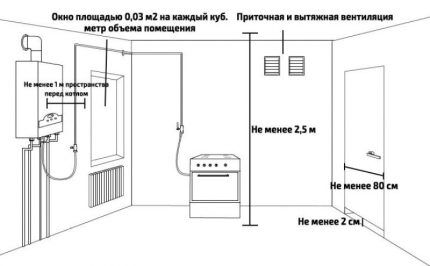
The supply of necessary air for the operation of a gas boiler must be ensured through coaxial chimney, transom, ventilation holes or a gap of 2-3 cm under the door.
Kitchen in an apartment and cottage
In home kitchens it is allowed to install boilers with a power of up to 60 kW. However, gas companies often allow the installation of devices with a power of only up to 35 kW.
Almost always this is not related to safety standards, but to the specifications for connecting to a gas pipe. Some gas pipelines are simply not able to provide the proper flow of fuel to powerful equipment.
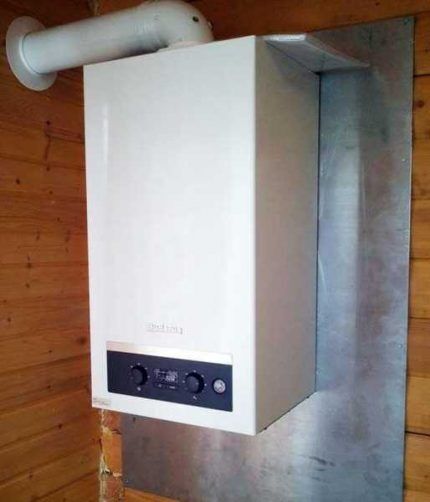
A kitchen for a gas boiler must meet the following requirements:
- volume – from 15 m3;
- windows – minimum area 0.03 m2 per cubic meter of room and with opening doors or transom;
- ventilation – with natural inflow and threefold air exchange (from 100 cubic meters/hour).
If the boiler is wall-mounted, then there should be at least 0.5 m from it to the ceiling and side walls, and 0.8 m to the floor. However, it can only be hung on a blank wall made of dense and fire-resistant structural materials.
Drywall, plastic, SIP or MDF are not allowed here. Such equipment is allowed to be mounted on partitions made of logs or timber, but only with a gasket made of non-combustible asbestos or metal with a thickness of 3 mm or more.
If the kitchen is part of a studio combined with a hall, then installing a gas boiler in it is prohibited. According to the requirements of GOSTs and SNiPs, installation of a gas boiler is permissible only in non-residential premises.
Boiler room at the enterprise
Regardless of the power, if the boiler is used by a legal entity, then the above standards do not apply. In this case, the boiler must be installed in a separate combustion room.
And the requirements for such a gas boiler room at an enterprise are more stringent. And the more powerful the equipment and the higher the steam temperature, the higher these standards.
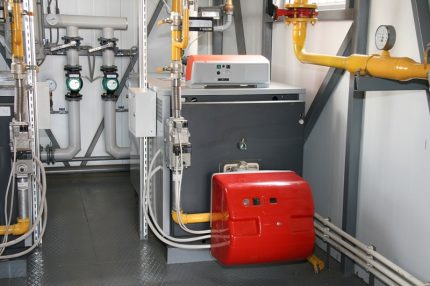
In the kitchens of apartments and furnace cottages, warning systems are recommended, but not required. And for boiler houses subject to control by Rostechnadzor, this is a mandatory requirement.
All room parameters for an industrial boiler are individual, prescribed in a separate project and separately agreed upon with the relevant government agencies. A lot here depends on the power of the installed equipment.
Standards for liquefied and natural gas
Various models of domestic heating boilers can operate on methane and a mixture of propane and butane. In both cases, the requirements for the minimum volume of the boiler room for a gas boiler, as well as other room parameters, are identical. However, there is one nuance in the question ventilation.
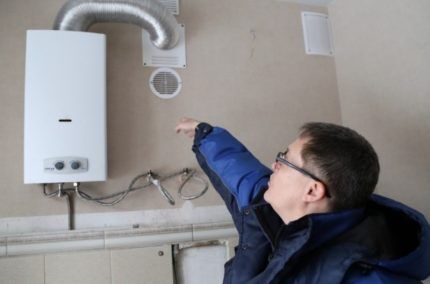
If you plan to place equipment in a boiler room or kitchen using main methane fuel, then the natural ventilation openings in the room should be located under the ceiling. In this case, their distance from the ceiling should not exceed 20 cm.
If the gas appliance will be powered by a gas holder or cylinder, then the room must have ventilation vents at a height of 10–15 cm above the floor.
Natural ventilation should be arranged so that when the boiler goes out or there is another gas leak, the gas goes outside. The accumulation of methane or propane in a room is a direct path to an explosion and fire.
Conclusions and useful video on the topic
Requirements for the boiler room in the cottage:
Boiler room for installation of a floor-standing gas boiler:
Where you can and cannot install a gas boiler:
If the rules and regulations for installing a gas boiler are not followed, then gas cannot be connected to the corresponding equipment. This applies to the requirements for the installation of the boiler, ventilation with smoke removal, and the size of the room. Any deviations from the above requirements can lead to tragedy.
If you have any questions or have personal experience in arranging a home boiler room, ask them in the comments below. Our specialists are ready to competently advise on the construction and equipment of a furnace for any gas appliance. Also, we and site visitors will be extremely interested in your practical knowledge gained from independently installing a boiler room.
